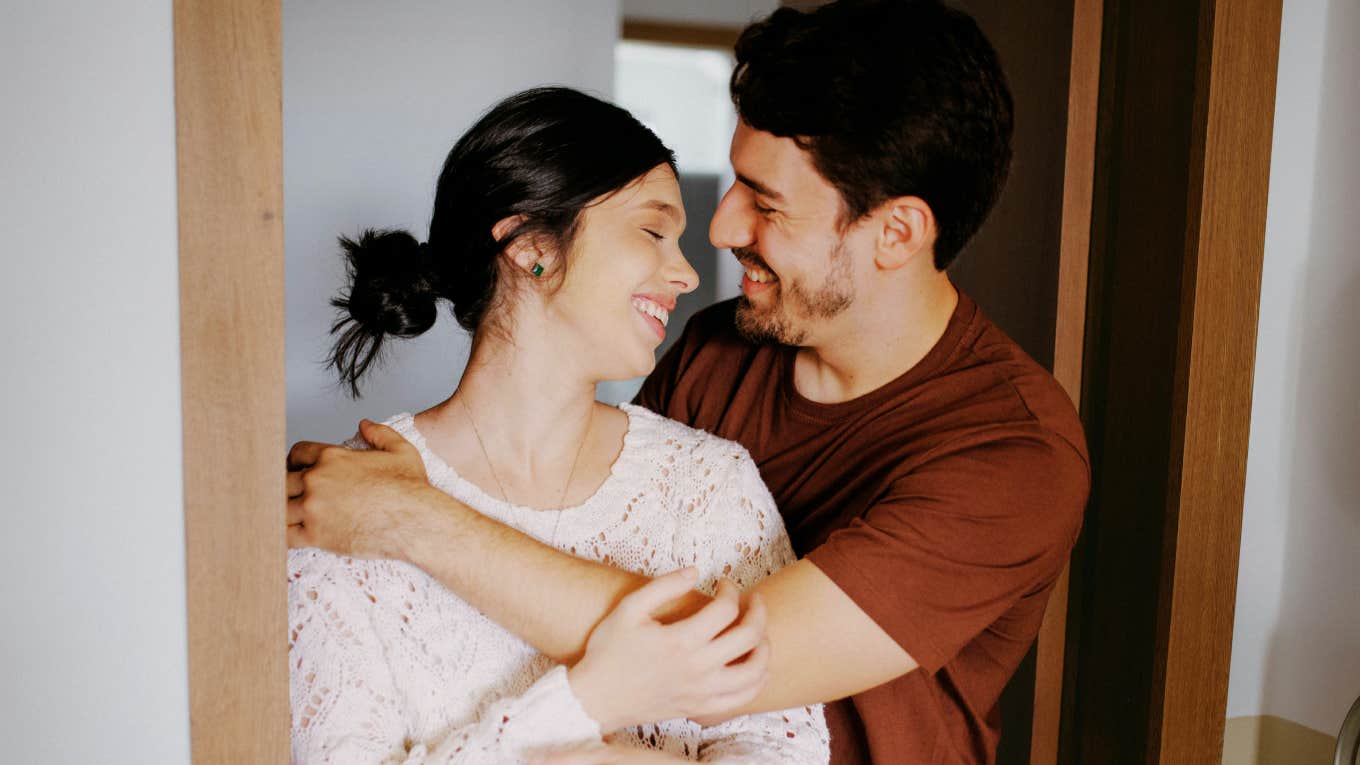If A Person Was Raised With Integrity, They'll Always Display These 10 Behaviors In A Marriage
 Jonathan Borba | Canva
Jonathan Borba | Canva Recognizing yourself and who you are is important to having a healthy relationship or marriage. You need to know your strengths and have a sense of yourself so your relationship is greater for it, not weaker because you're dependent upon someone else's contribution in order to feel whole.
When someone grows up with integrity, it shapes how they love, argue, apologize, and commit. These ten behaviors are about showing up with honesty and respect, even when it's uncomfortable — and in a marriage, those traits make all the difference.
If a person was raised with integrity, they'll always display these 10 behaviors in a marriage
1. Recognize who and what you’re responsible for
You’re responsible for yourself. To make sure you can maintain your daily life effectively. You’re responsible for your partner, to treat them with respect, love, honesty, and dignity. You are not responsible for them.
What started as good intentions can create strain in your relationship. Learning how to recognize and meet your own needs rebalances the harmony and creates more fun, confidence, and spontaneity in your marriage. When living in a codependent marriage, you didn’t set out to diminish the other parts of yourself and become tunnel-visioned toward the relationship; it happens slowly over time.
2. Stay focused on your interests
 Zhenny-zhenny via Shutterstock
Zhenny-zhenny via Shutterstock
If you can’t think of any, it’s time to start exploring what you like. Start by looking at any hobbies you had growing up that you enjoyed. Look into any groups that you can join in your local area. Be inquisitive and experiment with different activities until you find one that’s for you.
Perhaps when dating, you were smitten with your partner and didn't want to create tension, so you went along with everything. Or at least you didn’t mind so much doing things you would otherwise prefer not to do. It could have been the other side of the coin for you. You found someone who could take care of you, who had their life together, and you were so delighted when they came in to save the day.
3. Learn what your needs are and how to ask for them
More importantly, learn how to meet your own needs if your partner can’t. This will make you feel stronger and more self-sufficient in the long run. Dynamics don’t happen in isolation, so your partner found it so easy to be with you because you seemed to be on the same page. Or they enjoyed the sense of purpose they served in your life. In the beginning, it served a purpose, yet over time, this dynamic became frustrating and stifling for one or both of you.
"When your needs are met within a relationship, you'll experience higher relationship satisfaction and better overall functioning," recommended social worker Heather Hans. "Express your gratitude when the other person meets your needs. "Doing so lifts your spirit and attracts more of the same. When someone responds positively to your request, taking a moment to express genuine appreciation creates powerful ripple effects that extend far beyond simple politeness."
4. Get comfortable with saying no and hearing no
If you have difficulty saying no to your partner's demands, come up with ways you can say “no.” For example, “Yes, I can help you, but it will have to be after I go to the gym." Establishing boundaries is imperative to separating yourself from co-dependency.
Life coach Amy Bracht said people who can say no without feeling bad start small. "Those people who are kind and respectful but confident when they say no. They started small, declining, and taking a pass on things that are less emotionally fraught. Is there an activity that you'd rather not do? Decline it. Just one. Take that time and do something for yourself."
5. Understand that saying 'no' will feel bad at first
 fizkes via Shutterstock
fizkes via Shutterstock
Bracht continued, "Most people will move on from your 'no' without much of a thought, so let them. However, not explaining yourself can become more challenging the closer the relationship is. Remember, you teach people how to treat you. Be firm in not explaining yourself, but don't make a big deal out of it. If the other person does persist with the need for an explanation, a quick remark of, "Why are you so hung up on this?" can work wonders."
Once you start to say “no” or you hear “no,” you’re going to be hit with some feelings. Depending on which side you are you might be feeling guilt, anxiety, or fear of abandonment. It’s time to have a list of self-soothing activities you can do that aren't destructive. Practice activities like yoga, meditation, or taking walks when you're feeling down. These activities will help you work through those feelings positively, and they will be healthy for you.
6. Don't be afraid to show your vulnerability
If you’re the person who's usually together and often takes responsibility for your partner's feelings, try to be vulnerable to them. Open up and ask for help. This will make you feel closer, help you bond, and make you feel safer in knowing you can depend on your partner to be there for you while still being your strong self.
"Occasionally, you get disappointed with the outcome of your vulnerable act, along with feeling discouraged," cautioned confidence coach Lisa Petsinis. "That's OK. There is usually some kind of personal growth that comes out of even the most harrowing experiences. Every so often, you get what you thought you wanted when you put yourself out there, and sometimes, you get something even better.
7. Establish a support network
It’s time to find a great support network. You can join support groups for people in codependent relationships, or if you’re not inclined to do that, find up to five people you feel comfortable talking to, and talk about your struggle with co-dependency.
Ask them to help keep you accountable to change without judgment. This may help open your eyes to behaviors you didn't even realize you were doing.
8. Do research on boundaries
Couples in codependent relationships have trouble figuring out where they end, and their partner begins. Figuring out "you" and your role in the relationship, as well as your own needs, will greatly help improve your viewpoint and feelings on being codependent.
Life coach Mitzi Bockmann explained, "To understand healthy marriage boundaries, look at the four walls of your house. Those walls are the structure that holds your life together. They hold your food, bed, and possessions. It’s where you live your life. Marriage boundaries are the same as those four walls of your house. They are the things that support your marriage as it matures. To grow a healthy and fruitful relationship, you must have structures and boundaries to support it."
9. Sign up for couples therapy
 La Famiglia via Shutterstock
La Famiglia via Shutterstock
This is to help identify what your triggers are and what your codependent behaviors are. They can be subtle, and you’ve been using them your whole life to get your needs met.
Research explored how co-dependency comes from a relationship dynamic that was imbalanced when you were growing up. As children, we need our parents to show us how to be both autonomous and vulnerable. Yet when parents aren't good with one or both aspects, we learn to favor helplessness or over-competence. You then take these aspects into your relationships.
10. Be gentle and understanding with yourself
It takes time to change behavior, so don't expect that you won't be codependent overnight. This is a type of behavior you picked up along the way to meet your needs as a child, so it's been with you your whole life.
While they may have served a purpose when you were younger, chances are they no longer serve you, and the relationship or even marriage you're in now is suffering because of it. It’s served a purpose, but now it's time to let those codependent behaviors go so you can become the strong, independent person you long to be.
You might be worried that you will never feel as close to your partner again if you give up being codependent. However, you will gain a greater sense of self, leaving you feeling calm, grateful, and more joyous than ever.
The more you experience the world of two separate yet equal people within a relationship, the deeper the capacity to know the person you’re in a relationship with, and the richer your unique sense of "self" becomes.
Julia Nowland is a relationship therapist and the founder of Whole Heart Relationships. She specializes in helping couples with young children prioritize their relationship, improve their intimate lives, create a sense of fun, and fall back in love.

